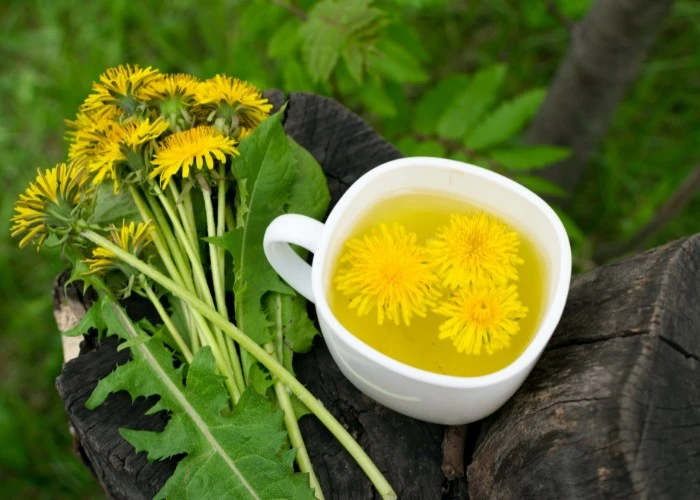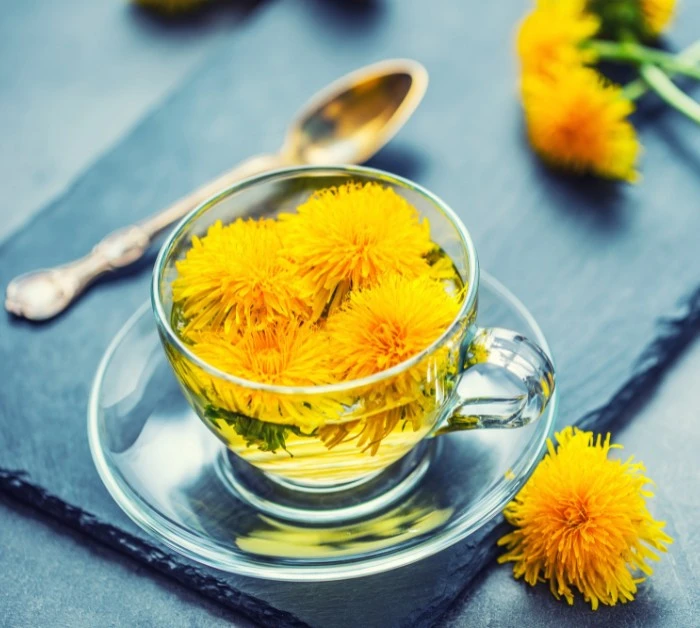Dandelion tea: potential benefits and side effects plus how to properly brew this herbal tea from dandelion flowers and roots
Despite their neglect, dandelions have a lot to offer. Tea is one of the simplest ways to consume dandelions. You can brew the entire plant or just the leaves, roots, or stems.
In this article, we will show you how to make dandelion tea from roots and flowers, as well as what dandelion tea is good for and the potential side effects of this herbal tea!
Before we get started, here are some interesting facts about dandelions:
- The name dandelion comes from the French word “dent de lion,” which means “lion’s tooth,” and refers to the coarsely toothed leaves.
- Dandelion seeds can be carried up to 5 miles from their source.
- The dandelion’s root, leaves, and flower are all edible. It can be used in food, medicine, and as a coloring agent.
- The dandelion flower blooms in the morning as the sun rises and then closes at night.
- For some people, consuming or touching dandelion can cause an allergic reaction. The plant’s milky sap (latex) may cause contact dermatitis, in which a person’s skin becomes red, itchy, or swollen after coming into contact with a dandelion and develops eczema-like symptoms.
This post may contain affiliate links, which means we may receive a small commission, at no cost to you, if you make a purchase through a link. For more information, please see our disclosure.
What is dandelion tea?
Dandelion tea is made from the dandelion flower’s leaves, flower, or roasted root. The dandelion is a member of the daisy family, and the entire plant is edible. The roots and leaves are naturally bitter, while the flower is lightly sweet.
Harvesting the leaves, drying them, and then making dandelion leaf tea is a great option. A strong floral aroma and a smooth, earthy flavor with herbaceous and even slightly minty undertones can be expected.
There is also the option of making dandelion root tea from the underground taproot. This dandelion root tea is sometimes used as a coffee substitute for those who enjoy the flavor and charm of coffee but cannot tolerate the caffeine.
As you can see, this herbal tea is extremely versatile and contains a plethora of essential nutrients and vitamins to help you feel better.
What is dandelion tea good for?
Dandelion is high in vitamins A, C, magnesium, potassium, calcium, iron, phosphorus, and zinc. Dandelion tea has only 25 calories per serving, making it an excellent substitute for sugary, fizzy soft drinks.
Diuretic effects
One of the first documented uses of dandelion tea was as a diuretic. The term “diuretic” refers to a substance that promotes urine formation, allowing a person to excrete excess water in a variety of ways.
This is especially beneficial for people suffering from high blood pressure, heart failure, swollen tissues, or kidney disease.
A pilot study published in the Journal of Alternative and Complementary Medicine found that two 1-cup servings of dandelion tea made from the plant’s leaves increased urine output.
Drinking more of any beverage will usually encourage fluid release because the kidneys keep the body’s water balance.
It is possible that dandelion may help the kidneys release more water, reducing bloating and discomfort, but this is unclear and more research is required to confirm this.
Linked to improved liver function
Dandelion root has long been used in folk medicine as a “liver tonic.”
According to a 2017 study, polysaccharides found in dandelions may be beneficial to liver function.
Dandelion polysaccharides are known to reduce liver stress and support the liver’s ability to produce bile. They also assist your liver in filtering potentially harmful chemicals from your food.
Despite the promising positive effects of dandelion tea on liver function, more research is needed to determine whether dandelions aid in liver function improvement.
May help prevent urinary tract infections
Dandelion roots and leaves, when combined with another herb, uva ursi, may help prevent urinary tract infections (UTIs).
Uva ursi is used in this combination because it kills bacteria, and dandelion is used because it increases urine flow and fights infection.
This combination, however, should not be used long-term because it is unknown whether uva ursi is safe for long-term use. More research is needed to assess the efficacy of dandelion for these applications.
Improves skin health
To stay fresh, vibrant, and youthful, your skin requires a lot of care and attention. Acne, on the other hand, is a skin condition that frequently interferes with your skin-care goals.
The good news is that dandelion tea is good for your skin, and this has been well documented.
According to a 2011 study published in Toxicological Research, the anti-inflammatory properties of dandelion tea reduced acne-related inflammation while increasing hydration and collagen production. According to a 2012 Japanese study, it also has anti-aging properties.
May help stabilize blood sugar
Dandelion root has been shown to have anti-diabetic properties, such as increasing insulin secretion and sensitivity and decreasing hyperglycemia.
Because it is a diuretic, dandelion tea helps the body remove excess sugar that has been stored in the body, which aids in the natural treatment of diabetes.
The anti-diabetic properties of dandelion are attributed to bioactive chemical components such as chlorogenic acid (CGA), chicory acid (CRA), taraxasterol (TS), and sesquiterpene lactones, according to a study published in the Review of Diabetic Studies.
It has also been used to treat diabetes due to its anti-hyperglycemic, antioxidative, and anti-inflammatory properties, according to researchers.
More research is needed, but dandelion tea’s blood sugar-stabilizing effects are promising.
Naturally anti-inflammatory
According to research, all parts of the dandelion plant contain antioxidants and natural anti-inflammatories.
Inflammation is involved in many different types of disease. Although there is no proven link between drinking dandelion tea and a reduction in inflammatory-related diseases, the compounds in this plant may promote better overall health by reducing inflammation.
May help improve digestion and gut flora
It’s no surprise that dandelion root aids digestion because it’s high in gut-friendly fiber.
The dandelion plant has been shown in studies to increase Lactobacillus and Bifidobacterium, the two most common species used as probiotics and associated with gut health. As a result, dandelion tea may help to reduce bloating, gas, and general digestive discomfort.
Furthermore, the root can act as a mild laxative in general, ensuring the efficacy of drinking dandelion tea for constipation. Meanwhile, dandelion tea for bloating is a fantastic herbal remedy due to its diuretic activity.
Full of vitamins and minerals
For a plant that is frequently regarded as a nuisance, dandelion packs a powerful punch and is rich in vitamins and minerals.
Dandelion tea is high in vitamins A and C, both of which help to boost the immune system and promote healthy cell growth.
Its reported effectiveness against seasonal colds may be due to the presence of vitamin C. Vitamin A is essential for maintaining healthy vision, neurological function, healthy skin, and other bodily functions. Dandelions are also high in vitamin K, which is important for bone health and blood clotting.
Dandelions are also high in potassium, magnesium, and calcium, making them a nutritionist’s dream as well as beneficial to your overall health.
Possible side effects of dandelion tea
Dandelion is generally regarded as safe by most people. It is important to note, however, that some people may have an allergic reaction to dandelion after touching or eating it.
According to the NIH, people are more likely to be allergic to dandelion if they are also allergic to similar plants, such as:
- ragweed
- marigold
- chrysanthemum
- daisy
If you have allergies, consult your doctor before taking dandelion.
People on certain medications should avoid dandelion tea because it can interfere with certain medications, particularly diuretics, kidney medications, and certain antibiotics.
Furthermore, because the potassium in dandelion may affect blood flow and clotting, it is best to avoid dandelion tea if you are taking blood thinners. Dandelion tea should be avoided by anyone taking blood pressure medication for the same reason.
Remember to consult your doctor first.

How to make dandelion tea
One of the most important facts about dandelion tea is that it is simple to find and prepare.
If you pick your own dandelions, avoid areas that have been sprayed with herbicides or pesticides. You don’t want to ingest the noxious substances contained in these chemicals.
Choose an area that is free of pollution as well. You want to look for plants that are younger and more tender because they are less bitter.
Dandelion root tea recipe (Dandelion coffee)
Dandelion coffee is another name for dandelion root tea.
The manufacturing and brewing methods produce a tea that tastes similar to coffee but does not contain caffeine. So, if you like the taste of coffee but want to reduce your caffeine intake, this is a great alternative.
This is also an excellent coffee substitute for those who enjoy the flavor of roasted coffee but are caffeine sensitive.
Step 1: Harvesting dandelion roots for tea
This is the most difficult step. The roots are difficult to remove. The bigger the bunch of leaves growing out of the ground, the bigger the roots.
Cut into the dirt around the root with a small shovel. Try to loosen the soil, then grasp the root as deeply as you can and pull.
Separate the root from the leaves and stems. Rinse thoroughly with cool, high-pressure water. With a sharp knife, cut the fresh roots into smaller pieces. You want them ¼ – ½ inch pieces or smaller.
To make this step easier, you can buy dandelion root, and you can order this unroasted Organic Dandelion Root here from Amazon.
Step 2: Roasting dandelion roots
Take 4 tsp dried dandelion root. Preheat the oven to 200 degrees Fahrenheit (95 degrees Celsius) and place the dandelion roots on a baking sheet lined with parchment paper. To avoid burning, rotate the roots frequently.
When you can easily and cleanly snap the roots in half, they’re done. If the roots bend and are flexible when broken, they require more roasting time. When the dandelion roots turn dark brown, they are ready for tea brewing.
When they’re done, try to cut them even smaller.
Step 3: Brewing dandelion root tea
Bring 2 cups of water to a boil in a small saucepan. Add the dandelion root to the boiling water and simmer for 20 minutes.
Using a fine-mesh strainer, strain the roasted roots. You can drink it on its own or with a little sweetener like honey or brown sugar.
Notes: If you think your tea is too strong or dark, simply add more water the next time. Alternatively, you can roast the root for a shorter period of time, resulting in a lighter tea.
Dandelion flower tea recipe
Use only the petals of the dandelion flower to make the most flavorful drink. The green parts of the flower head are bitter and unappealing. As a result, it is best to cut or pull the petals away from the green base.
Remove any dirt or insects by rinsing the petals in cool water.
For each cup of dandelion flower tea, use about 1/2 cup loosely packed dandelion petals.
Put the petals in a tea infuser ball and place them in a cup. Pour 8 ounces of boiling water over the tea infuser ball and set aside for 10 minutes to steep until the color and flavor are well dissolved in the water.
Remove the tea infuser ball and add sweetener to your tea.
The flavor of dandelion flower tea is mild and lightly sweet. You can sweeten it with honey, sugar, or stevia as desired.

Disclaimer:
While we have looked into the research on the health benefits of these tea, this is only for informational purposes and should not be construed as medical advice. Those with health-related questions should seek the advice of a medical professional. This article should not be used to diagnose, treat, cure, or prevent any disease.
Final thoughts on the benefits of dandelion tea and possible side effects
Dandelion tea is good for you; according to some studies, it may help prevent urinary infections; drinking this herbal tea has been linked to improved liver function; it is naturally anti-inflammatory and high in vitamins and minerals.
The best thing about dandelions is that you can make tea out of the entire plant. Dandelion tea can be made from its flowers, leaves, and root.
Dandelion coffee is another name for dandelion root tea. It’s a great coffee substitute, but it’s naturally caffeine-free. As a result, you’ll get the coffee flavor but not the caffeine.
You should be aware of the potential side effects before brewing this delicious herbal tea.
Dandelion may cause allergic reactions in some people. You should avoid drinking dandelion tea if you are allergic to plants such as ragweed, marigold, chrysanthemum, or a daisy. Also, if you are taking medication, consult your doctor before drinking dandelion tea.
Finally, when making your dandelion tea, experiment with brewing it from various parts of the plant. Separately, prepare tea from dandelion flowers, leaves, or roots. Discover which is better for you and enjoy your perfect cup of dandelion tea!




